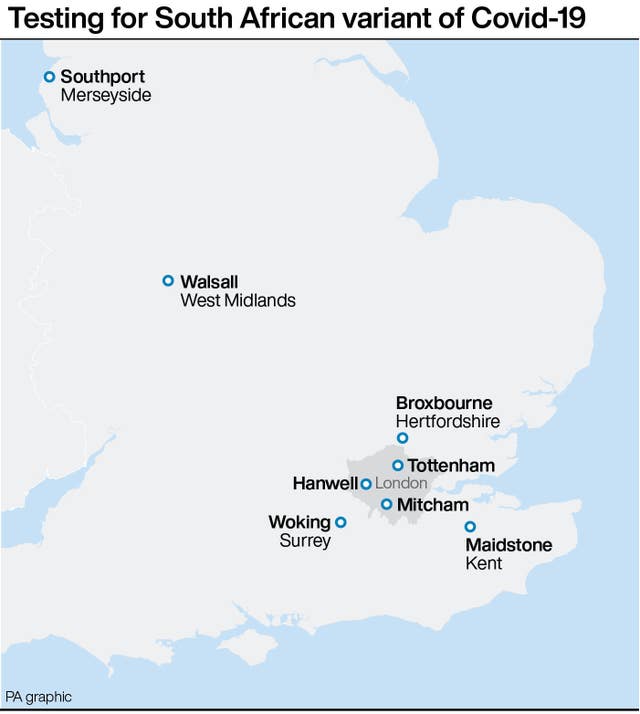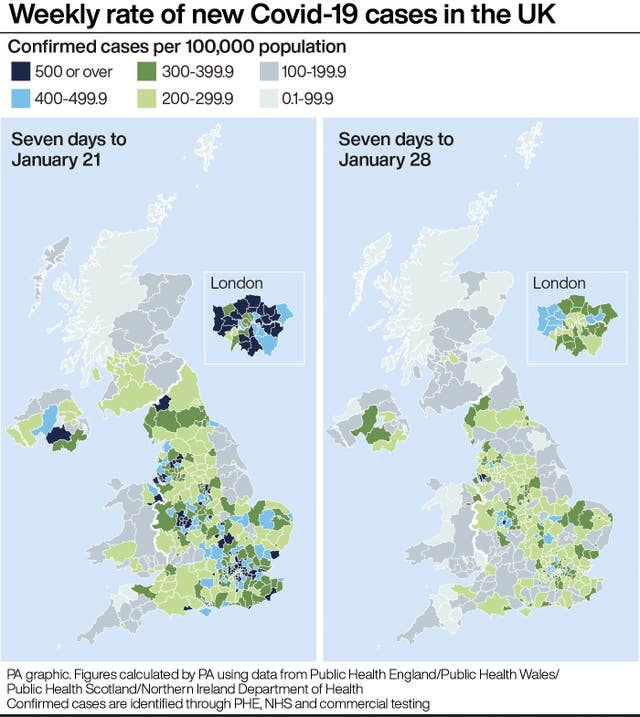Public health officials investigate strains in UK showing E484K mutation
Experts believe current vaccines will still be effective against new strains, although at a lower efficacy.

Public Health England (PHE) is investigating strains of coronavirus in the UK which have developed a mutation that has been worrying scientists.
Eleven cases in the Bristol area have been identified as the variant that originally arose in Kent but are now showing the E484K mutation.
A cluster of 32 cases in Liverpool also have the same mutation but relate to the original strain of coronavirus that has been around since the start of the pandemic.
The South African variant – which also shows the mutation – is under investigation in at least eight postcode areas of England where cases not linked to travel have been found.
A PHE spokesman said: “PHE is monitoring the situation closely and all necessary public health interventions are being undertaken, including enhanced contact tracing and control measures.”
The E484K mutation has been shown to reduce the effectiveness of vaccines in preventing people contracting Covid-19.
However, public health experts believe current vaccines will still be effective against strains with the mutation, although at a lower level, and are good at preventing severe disease.
Regional PHE officials said the mutation was detected in Liverpool last month as part of cases among staff at Liverpool Women’s Hospital. A cluster of an initial five cases was detected on January 10 among some staff who had attended an event outside the hospital, believed to be a funeral.
Earlier, Health Secretary Matt Hancock said testing was now under way in postcode areas affected by the mutation, alongside eight postcode areas affected by the South African variant.

It comes as:
– Charity fundraiser Captain Sir Tom Moore died at the age of 100 after testing positive for Covid-19.
– A study found the University of Oxford’s coronavirus vaccine offers protection of 76% up to 12 weeks after a single dose and may reduce transmission by 67%. The data from the study supports the four to 12-week prime-boost dosing interval that many global regulators have recommended.
– First Minister Nicola Sturgeon confirmed that lockdown restrictions in Scotland will remain in force until at least the end of February.
– There are 110 care homes across England where the vaccine programme has not yet started due to outbreaks.
– Interim trial results suggested Russia’s Covid vaccine is 91.6% effective against symptomatic coronavirus.
– Government data up to February 1 showed of the 10,143,511 jabs given in the UK so far, 9,646,715 were first doses – a rise of 350,348 on the previous day’s figures.
Speaking in the Commons, Mr Hancock said the Government is working closely with pharmaceutical firms in case vaccines need to be tweaked to accommodate new variants.
He said: “We’re working with pharmaceutical companies and with the scientists to understand both whether the such modifications are needed, where they are needed, and how they can be brought to use on the frontline as quickly and safely as possible.
“This is obviously a very important consideration given the new variants that we’ve seen.
“And we have confidence that modifications to vaccines, should they be necessary in large scale, will be available more quickly than the original vaccines.
“And just as we did first time round, when we got in there early and we bought at risk, so we are having exactly the same conversations right now with the pharmaceutical companies to make sure that we are right at the front of this one.”

Mr Hancock told MPs that the aim of community testing for the South African variant – currently targeting around 80,000 people in eight postcode areas – is to “stop its spread altogether”.
He said: “As with the variant first identified here in the UK, there is currently no evidence to suggest it is any more severe but we have to come down on it hard.
“Our mission must be to stop its spread altogether and break those chains of transmission.”
Regarding the E484K mutation seen in the Kent variant, Dr Jonathan Stoye, from the Francis Crick Institute, said the PHE report suggests the UK variant is now independently acquiring the E484K change.
“From a virological standpoint, appearance of new variants by mutation during replication cannot be considered surprising,” he added.
“Whether this change will provide significant growth advantages for the novel virus causing it to predominate remains to be seen.”

Dr Julian Tang, honorary associate professor at the University of Leicester, described the finding as “a worrying development, though not entirely unexpected”.
He said it is important that people follow lockdown rules to prevent opportunities for the virus to mutate further, suggesting that allowing spread could provide a “melting pot” for different emerging variants.
“We really need to reduce our contact rates to reduce the opportunities for viral spread (and) replication to reduce the speed with which these different virus variants can evolve,” he added.
Clinical trials for two coronavirus vaccines – Novavax and Johnson & Johnson – have shown the jabs offer some protection against variants with the E484K mutation.
However, they are less effective than against the variant that has been around since the start of the pandemic.

Laboratory studies also suggest vaccines developed by Moderna and Pfizer/BioNtech could work against variants, while variant checks against the Oxford University/AstraZeneca vaccine are ongoing.
Earlier, Andrew Hayward, professor of infectious disease epidemiology at University College London (UCL) and a member of the Scientific Advisory Group for Emergencies (Sage), said a “sustainable strategy” will be needed in the future to tackle coronavirus mutations.
He said that, while it is sensible to try to stamp out chains of transmission of variants, new strains will continue to be a risk and suggested borders cannot stay shut forever.
Asked on Sky News about the probability of more strains entering the UK unless borders are closed completely, or unless all people entering the country are forced into hotel quarantine for 14 days, Prof Hayward said: “Well, probably in the long term, 100%.
“The nature of this virus is that it will continue to mutate, as do all viruses, and new strains will emerge and they’ll emerge in many different countries in the world at different times, and you won’t notice that they are spreading until such time as they are quite widespread.
“The real challenge here is that, well, yes, you can think about completely shutting the borders or having quarantine, (but) what’s the endgame in that?
“Is that something that you’re going to do forever, because it looks like these strains may continue to arise in the long term?
“So we need some sort of sustainable strategy, and I think that’s very difficult for politicians to think about that.”





